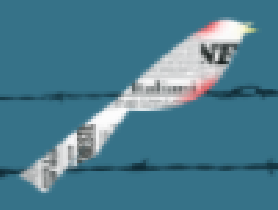(I viaggi ad Auschwitz come rimedio per una società affetta dal declino della storia? Un esempio di insegnamento della Shoah: i Treni italiani della memoria per Auschwitz.)
Saggio di Laura Fontana per The Holocaust and the Contemporary World, volume collettivo edito dall'Università di Gdanks (Danzica, Polonia) a cura di Wojciech Owczarski - Collana "Jednak Ksiazki" (Books Now), n. 6/2016

My paper will focus on a specific case study of Holocaust teaching, the Italian Memorial Trains to Auschwitz, which have become a very popular phenomenon, still unparalleled in Europe. After a short introduction on this phenomenon, some of the most relevant key-aspects of these educational projects will be discussed as well as some issues relating to Holocaust teaching in Italy in general. Namely, the main argument will be that memorial trains are an example of deterioration of Holocaust teaching. Why should historical knowledge of the Holocaust be facilitated, if not even conveyed, by collective trips to mass murder sites? It is worth raising this question.
In Italy, unlike many European countries, the Holocaust is not a mandatory topic in the national curriculum. therefore, its teaching depends almost exclusively on teachers' personal initiative and motivation.
Since the implementation in 2000 of an Italian law establishing January 27th as National Holocaust Remembrance Day, school trips to the Nazi concentration camps have been constantly growing. In particular, over the last two decades the attention devoted to Holocaust in relation to memory culture and public debates has also increased considerably (Gordon 2012). As a matter of fact, year 2000 marked a watershed in the Italian approach to the Holocaust, pushing the expansion of memorial trips to a nez level and making Auschwitz, the main if not unique destination of these visits, not only the symbol of the genocide of the Jews but also the essence of evil.
Until a certaom time, visiting a memorial site has been considered only a step within a borader teaching on World War I and on the genocide of the Jews - i.e. an option among many other pedagogical tools. According to the latest trend a trip to Auschwitz today is considered not only as a "present-day rite of passage"(Cywińki 2014), but as a stand-alone goal. In other words it is seen as the best methodology to teach this topic to youngsters and also as a crucial educational tool to raise awareness about its lesson, under the slogan: "Never Again!"
Given the growing success of the Italian Memorial Trains as educational projects for the schools and therefore their strong connection with the way history is taught, it is woth questioning how teachers respond to the major challenge they are faced with: combining good history teaching with the moral lessons of Auschwitz.
Scarica il volume per leggere tutto il saggio
Museo della città
Via tonini
47900RiminiRN
Italia

